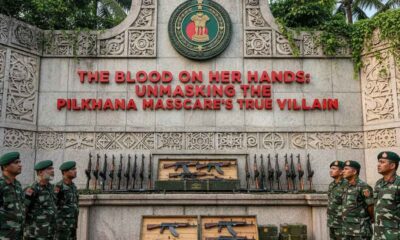Bangladesh Breaking News
Bangladesh’s New Dawn: Navigating the Aftermath of Hasina’s Fall

In July, Bangladesh witnessed a historical upheaval as a mass uprising, primarily led by student protesters, successfully toppled the government of Sheikh Hasina and her Awami League party, which had established an increasingly dictatorial regime over the past 15 years. The nation has turned a significant page in its history, yet it now grapples with the daunting task of rebuilding amidst chaos left behind.
Before her departure to India on August 5, Hasina’s government faced severe accusations, particularly tragic loss of life during protests. Reports indicate that police killed at least 90 individuals on the day before her fleeing, and children were among those targeted in the a violent crackdown on dissent. This brutal suppression has led to widespread public outrage and resentment towards the Awami League, once a dominant political force in Bangladesh.
A New Leadership Era
Following Hasina’s exit, Nobel laureate Muhammad Yunus has stepped in to lead an interim government, proclaiming this transition as Bangladesh’s “second liberation.” Yunus faces the monumental challenge of navigating political landscape and addressing extensive damage inflicted on nation’s democratic institutions, which have been eroded under Hasina’s rule. His first address to nation emphasized need to restore the “lost glory” of government institutions.
However, remnants of Hasina’s authoritarianism present a formidable obstacle. Political climate has been characterized by a recurring cycle of power struggles between Hasina’s Awami League and Khaleda Zia’s Bangladesh Nationalist Party (BNP), which had previously alternated in governance. This pattern was disrupted in 2011 when Hasina abolished caretaker government system, undermining electoral process and facilitating rigged elections. Consequently, BNP claims that nearly half of its 5 million members face legal charges, highlighting systematic suppression of opposition.
Rebuilding Trust and Institutions
ramifications of Hasina’s rule extend far beyond politics; and encompass severe degradation of public institutions. Police force, a critical component of law and order, has been disbanded and is struggling to regain public trust. military, historically involved in political matters, must also distance itself from partisan influences and focus on its primary defense responsibilities.
Judicial integrity has been severely compromised, with reports of politicized appointments and intimidation of judges, exemplified by the 2017 resignation of Chief Justice Surendra Kumar Sinha, who sought asylum after facing threats from military intelligence. se abuses of power have left the judiciary in disarray, necessitating comprehensive reforms to restore public confidence.
Moreover, Bangladesh’s economy is in dire straits, marred by rampant corruption. Transparency International highlights that approximately $3.1 billion is laundered annually, amounting to more than 10% of the nation’s total reserves. This level of corruption has fueled public disillusionment and demands for accountability.
Political Vacuum and Future Prospects
With the Awami League now deeply unpopular, the BNP emerges as only significant political entity poised to fill vacuum. However, both Khaleda Zia, the party’s leader, and her son, Tarique Rahman, face significant challenges. Zia, who is gravely ill, and Rahman, living in self-imposed exile in the UK, struggle to connect with the younger, more dynamic generation that led recent protests.
Bangladesh’s median age is around 25, and the uprising was largely driven by Generation Z, illustrating a generational disconnect between traditional political leaders and youth. This demographic shift indicates that the political landscape is changing, and established parties may need to adapt to remain relevant.
International Role and Challenges Ahead
As Bangladesh navigates this tumultuous transition, the West must adopt a proactive stance. The U.S., in particular, has historically overlooked transgressions of Hasina’s regime, undermining its credibility as a promoter of democracy. Secretary of State Antony Blinken’s threats of visa restrictions prior to rigged elections failed to yield tangible consequences, raising concerns about American priorities in the region.
India, a critical player, has supported Hasina’s administration due to security interests, especially concerning its northeastern states bordering Bangladesh. However, this alignment has fostered anti-Indian sentiment within Bangladesh, complicating future diplomatic relations.
Moving forward, the U.S. must recognize Bangladesh’s importance as a sovereign nation, rather than merely a pawn in its strategic rivalry with China. With China emerging as Bangladesh’s primary trading partner, this geopolitical complexity underscores the need for a nuanced approach.
interim government, under Yunus, must prioritize establishing law and order and addressing human rights violations. Initiating a transparent investigation into the events of July and creating a national office to address cases of enforced disappearances will be critical in restoring public trust. Additionally, international support for a new constitution that reflects diverse identities within Bangladesh is vital for fostering long-term stability.
Conclusion
Bangladesh stands at a crossroads, poised for potential renewal but facing substantial challenges. legacy of Hasina’s authoritarian rule will not disappear overnight; rebuilding nation’s democratic institutions and restoring public trust will require concerted efforts from both domestic leaders and international community. As the country embarks on this transformative journey, all stakeholders must commit to fostering a just and inclusive society for the future.
- When a Government’s Brutality Backfires The Atlantic
- Bangladesh Picks Up the Pieces After the Revolution Foreign Policy
- Bangladesh After Sheikh Hasina The Quint










